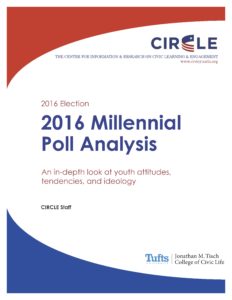CIRCLE 2016 Millennial Poll: Full Analysis
 Millennials are the most diverse generation in American history. Their multifaceted diversity shapes their pathways to civic and political engagement, and it results in sometimes dramatically different political views and experiences. It also impacts how young people are reacting to and engaging with this year’s historic presidential election between Hillary Clinton and Donald Trump.
Millennials are the most diverse generation in American history. Their multifaceted diversity shapes their pathways to civic and political engagement, and it results in sometimes dramatically different political views and experiences. It also impacts how young people are reacting to and engaging with this year’s historic presidential election between Hillary Clinton and Donald Trump.
We previously released analysis from this poll about Millennial presidential candidate support, attention to the 2016 elections, and party/campaign contact of Millennials. That analysis, which includes important differences in battleground states and by gender, can be found here.
Today’s release looks even more deeply at the Millennial generation and at differences within the generation. Two major themes emerge: first, Millennials across the board share a deep skepticism of most major political and public institutions, and less than half of Millennials believe they have a legitimate voice in the political process. Second, there are significant differences by race and ethnicity, gender, religion, and educational attainment that shape young people’s worldviews and, in turn, their candidate of choice in the 2016 presidential election. In fact, our analysis allows us to provide some context about who the Millennial supporters of each candidate are, and what they believe in.
Read our 2016 Millennial Poll Analysis
Major findings about Millennial Trump supporters include:
- 57% are men, 84% White (non-Hispanic), 39% Protestant, 21% Catholic, and 23% not affiliated with a religion. A larger share of Trump supporters are Protestants than among Clinton supporters (24%).
- Their household income, on average, is higher than the average household income of Clinton supporters. Most live in single-family homes.
- 85% are dissatisfied with the way things are going for the country, and they are far more likely than Clinton supporters to believe that the country’s best days are behind us.
- Trump supporters are less experienced with various types of political engagement, and more likely than Clinton supporters to say that they would “never, under any circumstances” do things like volunteer for a campaign or attend a political rally, suggesting that Trump supporters are overall less likely to be politically engaged.
- Trump supporters are not necessarily “less educated” than Clinton supporters. Although they are slightly less likely to have completed college (24% of Trump supporters and 29% of Clinton supporters), Trump supporters are also slightly more likely to have at least some college experience (64% among Trump supporters and 61% among Clinton supporters).
Meanwhile, Millennial supporters of Secretary Clinton:
- 54% are female, 40% White (non-Hispanic), 28% Hispanic, and 21% African-American.
- 52% live in single-family homes, and 29% live in apartments. Their average income is lower than that of young Trump supporters.
- 42% are satisfied with the state of the country (compared to just 15% of Trump supporters), and 38% believe that the country’s best days are yet to come (compared to 21% among Trump supporters).
- Twice as likely as Trump supporters (35% vs. 17%) to name “violence against people of color” as one of the top three problems in the country. Similarly, 38% recognize prejudice against people of different ethnicities as an important issue, compared to 12% of Trump supporters.
CIRCLE developed this survey and the polling firm GfK collected the data from their nationally representative panel of respondents between September 21 and October 3, 2016. The study surveyed a total of 1,605 people aged 18 to 34 in the U.S., with representative over-samples of Black and Latino youth (N =160 and N=354, respectively), and those who are living in potential swing states (AZ, FL,GA, IA, IN, MO, NC, NH, NV, OH, PA, and UT). The national sample has 1,410 Millennials, with oversampling in the swing states (N =805 in “safe states,” and N =605 in swing states). The margin of error is +/-3.0 percentage points. Unless mentioned otherwise, data below are for all Millennials in our sample.





